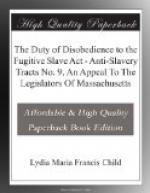The man who claimed this unfortunate family as chattels acknowledged that they had always been faithful servants. On their part, they complained of cruel treatment from their master, as the cause of their attempt to escape. They were carried to the United States Court, under a strong guard, and there was not manhood enough in Cincinnati to rescue them. What was called law decided that they were property, and they were sent back to the dark dungeon of interminable bondage. The mother could not be induced to express any regret for the death of her child,—her “pretty bird,” as she called her. With tears streaming from her eyes, she told of her own toils and sufferings, and said, “It was better they should be killed at once, and end their misery, than to be taken back to slavery, to be murdered by inches.” To a preacher, who asked her, “Why did you not trust in God? Why didn’t you wait and hope?” she answered, “We did wait; and when there seemed to be no hope for us, we run away. God did not appear to help us, and I did the best I could.”
These poor wretches were escorted through the streets by a National Guard, the chivalry of the United States. There was not manhood enough in the Queen City of the West to attempt a rescue; though they are very fond of quoting for themselves, “Give me Liberty, or give me Death!” Men satisfied themselves by saying it was all done according to law. A powerful plea, truly, for a people who boast so much of making their own laws!
These slaves were soon after sent down the Mississippi to be sold in Arkansas. The boat came in collision with another boat, and many were drowned. The shock threw Margaret overboard, with a baby in her arms. She was too valuable a piece of property to lose, and they drew her out of the water; but the baby was gone. She evinced no emotion but joy, still saying it was better for her children to die than to be slaves.




